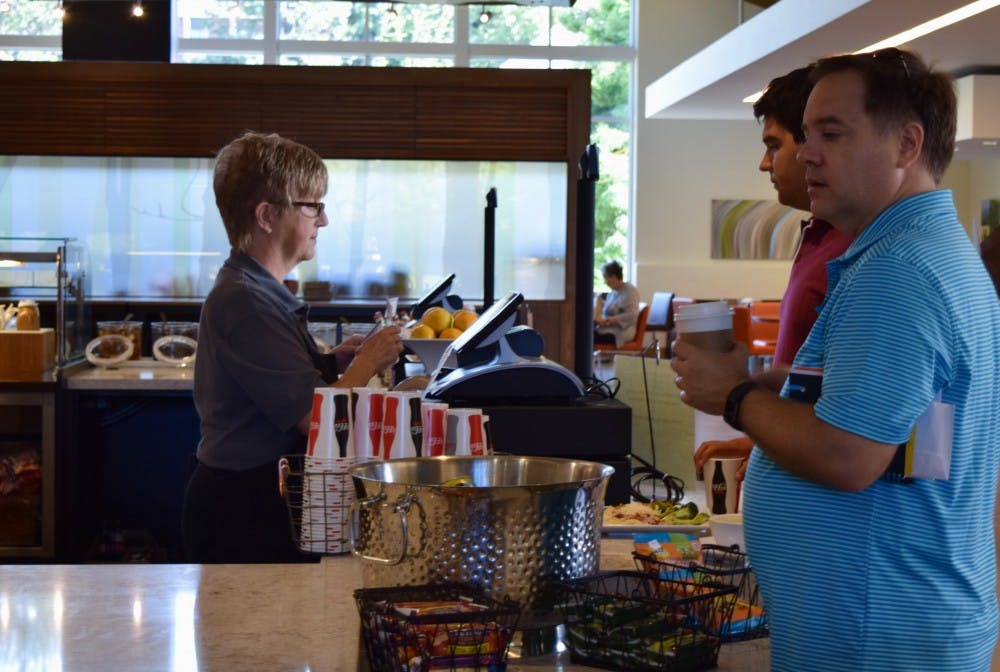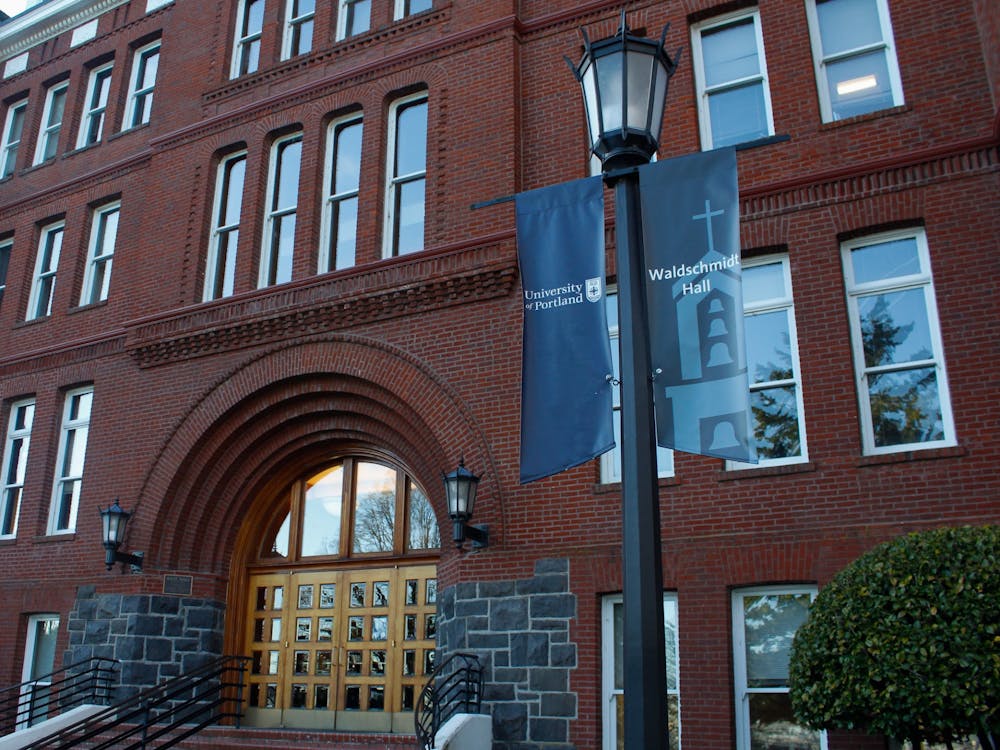Bon Appetit has begun addressing a myriad of student complaints ranging from small portions, long wait times, high prices and undercooked food. Recently, Bon App made comment cards available in The Commons and The Pilot House asking for student feedback after an anonymous group of students canvassed dorms with leaflets about their campaign calling on the University to remove Bon App as its sole food provider.
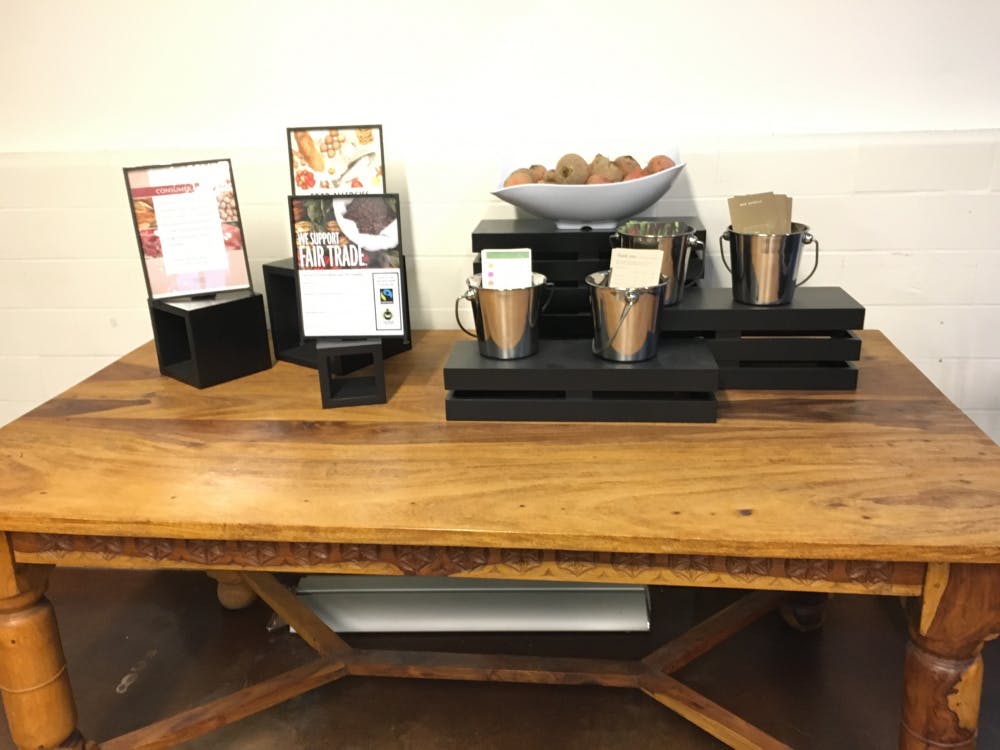
On Monday night, UP's Bon App general manager Kirk Mustain, district manager Marc Marelich and regional vice president Lori Flashner spoke to the ASUP Senate and around 15 other students about what the food provider is doing to listen and respond to student concerns.
Mustain addressed the campaign at the start of Monday's meeting.
"We do want to talk about the petition and we’re not going to shy away from that," Mustain said. "I think part of what it has made us realize is that we need to be more proactive in terms of how we gather information.”

Mustain discussed the student feedback and steps the food provider is taking to address student complaints, including adding more variety to menus, revisiting prices in Mack’s Market and other on-campus eateries by comparing them to those of other local markets, and providing further staff training on food safety.
The most common requests among students in the comment cards, according to Mustain, were providing a greater variety of food options, vegan options and late-night menu options, bringing quesadillas back to The Pilot House and serving larger portions.

ASUP advertised the event on its social media as an opportunity for students to ask questions about Bon Appetit, but some were disappointed to find that the event was not open forum. Students were allowed to write questions down on a piece of paper for an ASUP senator to read aloud. Twenty-five questions were asked.
“I left plenty of feedback on their (Bon Appetit’s) website, and none of it has been addressed,” senior Tristan Rowley said. “And then they make this panel and I think, ‘Oh, OK. I’ll come and tell them what’s up and maybe they’ll actually hear me.’ Then it’s just questions and them talking about how awesome they are.”
On Monday, and in earlier interviews with The Beacon, Mustain addressed a number of student concerns including undercooked food, long wait times, portion sizes, prices, variety and global authenticity.
Undercooked food

Sophomore Christina Spires told The Beacon that she worries about her health and the potential of getting sick from Bon Appetit’s food.
“I try to stick to the rule of thumb — if it’s not the raw food in its natural state, don’t eat it,” Spires said. “I hate to say that about a school I pay so much money to be here for and my meal plan but I have to look out for myself.”
While some students have complained about safety practices, including undercooked meat and employees not wearing gloves when serving food, Mustain said that every piece of meat should have its temperature taken and safety protocols are enforced through discussions before shifts and through training.
“They all use the thermometers over there and those are all standards set by the Health Department, and we adhere to all of those,” Mustain said.
In fact, both The Pilot House and The Commons received excellent scores from the Multnomah County Health Department in their most recent inspections: 100/100 for the Pilot House and 95/100 for The Commons.
“We’re continually working on training with people, that’s the biggest one,” Mustain said. “It’s a pre-shift talk about the meals and what we’re serving and going through that with everybody. But not everybody hears the message.”
Long wait times
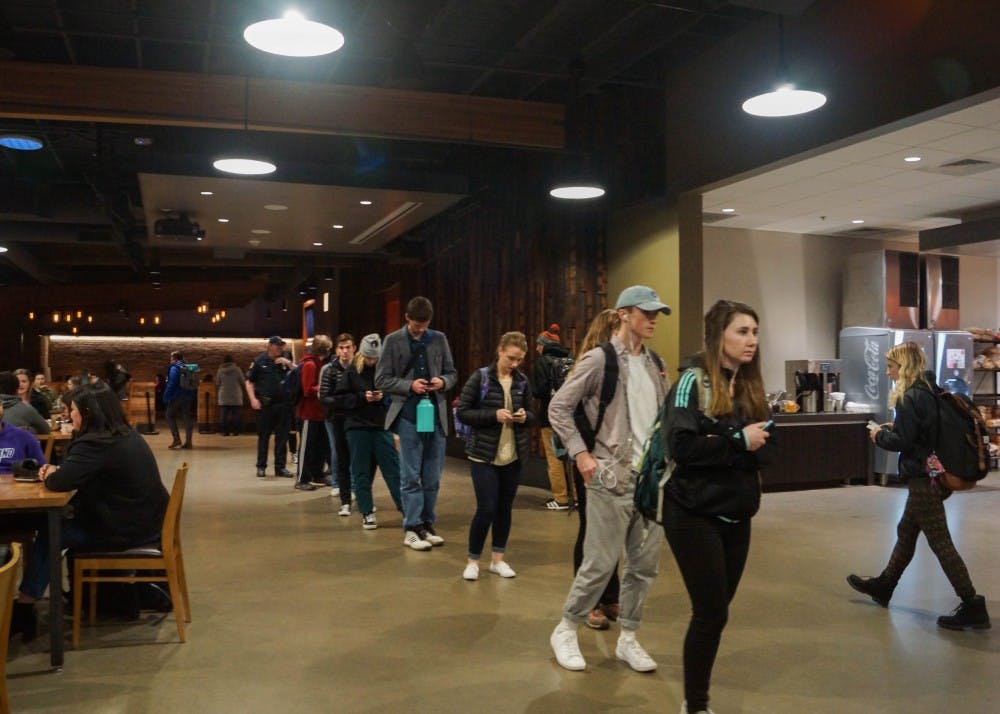
During busy hours at The Pilot House, students can wait up to 25-30 minutes for their food.
“It’s not really anyone’s fault,” Spires said. “I know things happen, like they’re short-staffed because people get sick, and things like that happen. But it also sucks when you’re just trying to get a salad and the wait is at least 20 minutes.”
In response to complaints about long lines and wait times, Kirk pointed out the challenges of serving meals to thousands of people every day, especially when they want it at around the same time. Between The Commons and The Pilot House, Bon Appetit has on average, 41,000 transactions per week and employs around 80 students and 140 full-time employees.
Mustain says that the growing popularity of the Pilot House can contribute to long wait times.
“It used to be a 70-30 dichotomy,” he said. “70 (percent of students) went to The Commons, most of the day, and 30 percent Pilot House. But now it’s a 50-50. The space that was designed in there has outgrown itself already. They’re doing the same amount of production in a six-person line that The Commons is doing in a full kitchen.”
Some orders will just inevitably take longer though, Mustain said on Monday.
“I think a lot of it is think about what you’re ordering,” Mustain said. “Some of those things just by nature take longer.”
Portion sizes

Many Pilots are dissatisfied with the portion sizes at both The Commons and The Pilot House. Senior Aziz Alayadhi said that portion sizes have decreased since he was a freshman. Alayadhi attributes this partially to the fact that sides, like fries, now come in smaller cups instead of being directly placed in the basket.
“You used to get a lot more for your points than what you do now,” he said.
Mustain said that Bon Appetit has never purposely decreased portion sizes.
“They’re pretty standard,” Mustain said. “A lot of it’s the utensils we’re using, so it’s not intentional. New staff maybe.”
Mustain also said that Bon Appetit will soon bring back half salads and half bowls at The Commons. He explained that The Commons recently switched to different dishware and initially did not order any smaller bowls. “But we’ll be getting those back in,” he said.
Prices

Some students on Monday asked what Bon Appetit planned to do about high prices in Mack’s Market.
Mustain said he plans to bundle certain to-go foods together, make them cheaper and add side salads to the menu. He also said that Bon Appetit is working to provide more reasonably priced staples at Mack’s Market, including milk, eggs, jelly and peanut butter.
Marelich said the higher costs are dependent on a number of things, including the company’s commitment to buying locally, paying employees above Portland’s minimum wage and supplying the market with “cool” and “natural” products.
“We want to make sure your dollar goes as far as it can,” Mustain said. “I realize that eating in the same restaurant every day for over a year can be challenging.”
Variety
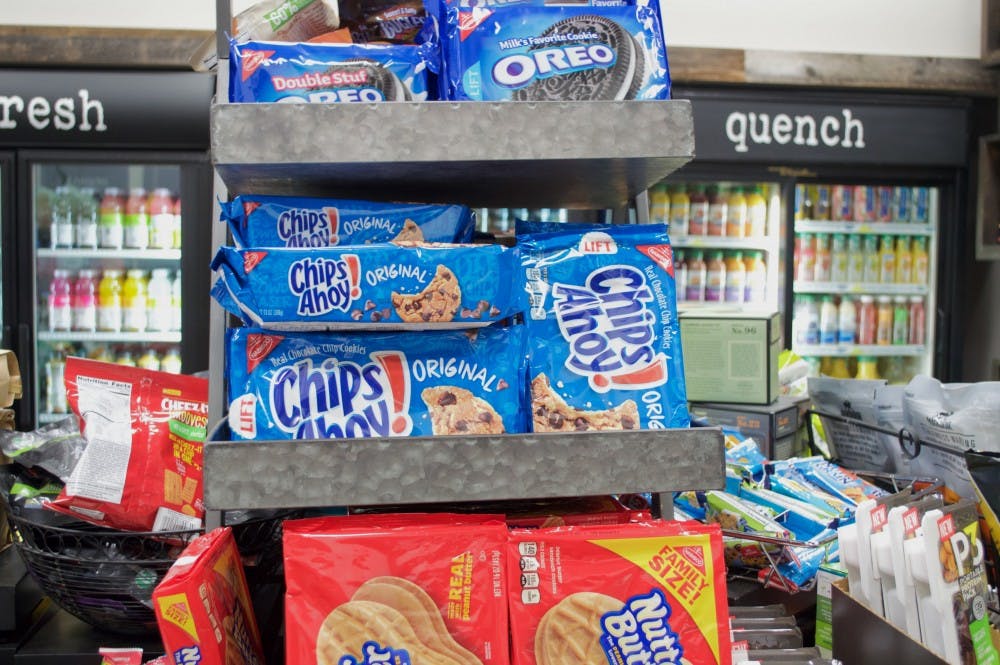
The University of Portland is located in a “food desert,” according to the USDA, which means there are no grocery stores or whole food options within a one-mile radius of campus.
Because students without cars have fewer options, Bon Appetit is challenged with filling in the gaps. Mustain said increasing the variety of food options is a high priority, and he announced that the Pilot House and The Commons would expand their menus.
"We have our core menus, but we've really just pushed on make sure there are lots of specials," Mustain said.
He also said the company is looking into adding more hot breakfast items and offering more to-go breakfast foods.
"We're looking at breakfast menus. They need to be fleshed out a little bit more,” Mustain said. “There needs to be variety on those."
Mustain acknowledged on Monday that the company can improve its selection of vegan and vegetarian options.
“I think we can do a better job and we're working on that,” Mustain said. “I think that that's something that can be put a little more in the forefront. We brought some products in that we think will help accomplish that."
Global authenticity

Bon Appetit strives to serve cuisines from all over the world, but the execution of the “global” food station in The Commons is also among the list of student complaints.
Spires grew up eating traditional gumbo, and she was let down by The Commons’ take on the Cajun meal.
“It seemed to me, when I look at their recipe list, that they utilize whatever was on hand instead of trying to make it more authentic,” Spires said. “For me, being someone with African American heritage, gumbo is a big part of my culture because it’s something that my family traditionally does for big events and important events.”
In her junior year of high school, Spires spent time in Cambodia, where she also tried authentic Thai cuisine. She was surprised to find that Bon Appetit’s Thai bowl used glass noodles rather than the traditional broad rice noodles used in dishes like Pad See Ew.
“If you’re going to acknowledge someone’s culture through food,” Spires said, “you should do your best to do that wholeheartedly.”
Mustain says that cooks at Bon Appetit are working with limited resources.
“If you look at our bowls, they’re always ‘inspired by,’” Mustain said. “We know that we can’t necessarily do it authentically so we try to be inspired by ingredients from that area. We try to source the ingredients that we get. The indigenous ingredients are just not available to us, so we try to get a close approximation.”
Keeping things in perspective
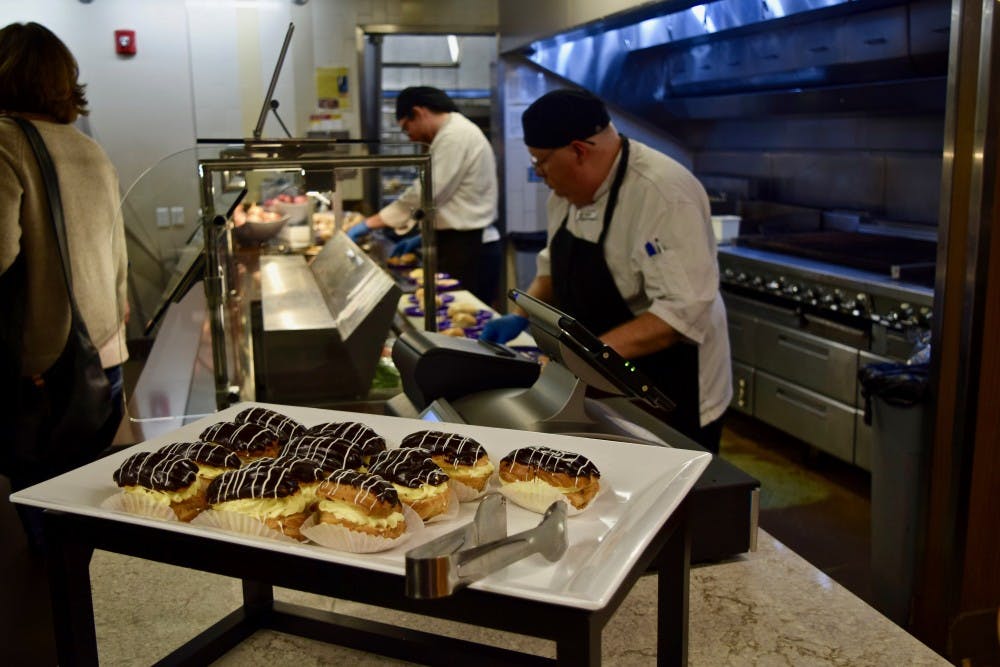
Senior Marie Jobes, who has worked for Bon Appetit for four years, said that students need to gain some perspective in criticizing the food service on campus.
“It’s easy to point out flaws in something, rather than look at the big picture,” Jobes said. “I dont think it’s realistic for people to want really good quality food and service without lines for hardly any money. That’s just not possible.”
College campuses across America are notorious for serving low-to-average-quality food. Journalist and author Malcolm Gladwell argued that campuses should serve bad food, as money drained into gourmet meals takes away from scholarship funding.
Some students who have transferred from other colleges say UP students don’t know how lucky they are.
Senior psychology major Kat Thatcher spent her first year and a half at Loyola University in New Orleans. Loyola’s food provider is Sodexo, which on top of supplying dozens of colleges, is also a food provider for private prisons. Thatcher said that the food at Loyola didn’t fall far behind.
“There were sometimes still feathers in the fried chicken, and when we mentioned that to the workers, they just said to pluck them out,” Thatcher said.
Students also take for granted the sustainability efforts of Bon Appetit, Thatcher said. Her old school didn’t recycle, compost, locally source or hire student workers in food service.
“If you were vegan or vegetarian there were pretty much no options except for the wilted salad bar,” Thatcher said. “My freshman year I lost 20 pounds because I just couldn’t eat the food.”
Thatcher said that no college is likely to fulfill students’ every need, but Bon Appetit is far from the worst option.
“Keep in mind that you’re in college,” Thatcher said. “This isn’t a five-star restaurant, and as far as I’m concerned people are still getting pretty good food.”
Mustain encouraged students to voice their concerns on comment cards in The Commons or The Pilot House, or to fill out a form at the bottom of Bon Appetit’s main website.



